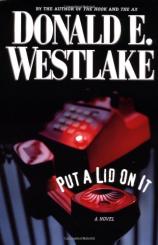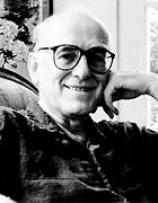Interview: May 3, 2002
May 3, 2002
Donald E. Westlake, author of PUT A LID ON IT, has an extensive bibliography and has carved out his own particular niche in the mystery genre. Westlake comments on his writing process and what type of characters interest him most in this interview with Bookreporter.com's Joe Hartlaub.
BRC: You already have a bibliography the likes of which most authors would envy. You continue at this late date --- and with the publication of PUT A LID ON IT --- to write novels of a quality that writers of any genre can only aspire to. What do you do to maintain the quality of your work?
DW: I don't do anything about maintaining quality, I just try to tell a story in such a way as to interest myself. I leave questions of quality to others.
BRC: You were crafting novels featuring the protagonist as anti-hero long before such became fashionable. Francis X. Meehan in PUT A LID ON IT certainly fits that description; he is the most sympathetic character in the novel, and he's a career thief. It is incidental that the second most-sympathetic character is an attorney. And Meehan, of course, is not the only criminal you have written about; there are Dortmunder and Parker, among others. What is there about the criminal mind that you find the most intriguing as a launchpad for a character?
DW: I find characters who are at cross-purposes with society, or opposed to society in some way, interesting because they are by definition the underdogs. They have to be clever, cunning, imaginative, dogged and wily, whereas society merely has to lean its weight a little. If you think of movie studio executives, say, as society, then I root for the independent producers.
BRC: As much as I enjoyed Meehan, the character whom I perhaps enjoyed the most in PUT A LID ON IT was Goldfarb. I found it particularly interesting in the way in which she remained inherently true to herself throughout the novel while going through some subtle but important changes through her experience with, and exposure to, Meehan. Was Goldfarb modeled after anyone specifically or is she entirely your own creation?
DW: I don't cast characters from life, but let them grow up on their own. Because Meehan was so quick and elusive, Goldfarb had to be somebody who could react fast.
BRC: Meehan, in PUT A LID ON IT, is a very intriguing character. He is, to me, the opposite side of the Parker coin. He is very nonviolent, and likable, unlike Parker. Yet he is like Parker in the sense that he is a career criminal and is likely to be the most intelligent, or clever, person in a room at any given time. Did you consciously make Meehan the antithesis (to an extent) of Parker or did he evolve that way as you were writing PUT A LID ON IT?
DW: Meehan evolved into his story. If you think of Parker as fast like a baseball or football player, Meehan is fast like a standup comic.
BRC: Your career as an author of fiction of a number of different genres has spanned several decades. Is there any one book which you felt constituted a significant turning point in your career?
DW: I don't know that any one book was of larger than normal significance in my career. My method has been more like water torture, one drop at a time.
BRC: There are a number of authors who have acknowledged your influence upon their careers. Have there been any in particular whose acknowledgment you found particularly gratifying? And if so, for what reason?
DW: Elmore Leonard and I share a tendresse. That's gratifying.
BRC: Do you have any plans for a future novel involving Francis Xavier Meehan? What are you working on now?
DW: I never say never, but I can't think that Meehan would attract my interest again. He's gone through what he had to go through. Now I'll just let him go bowling with Bernie.
BRC: On a related note, can we look forward to the release of any of your heretofore out of print works in the next year?
DW: Ask my publisher. Ask 2 or 3 times.
BRC: WHAT'S THE WORST THAT COULD HAPPEN has recently been adapted for film. Do you presently have any other novels that are being considered for adaptation for movies or television?
DW: Last year's BAD NEWS is in development, with screenplay by Doug Wright, who did Quills, and Milos Forman to direct. Our hopes are high.
BRC: Have you read anything in the past six months that you would recommend to our readers?
DW: You mean not by me?




